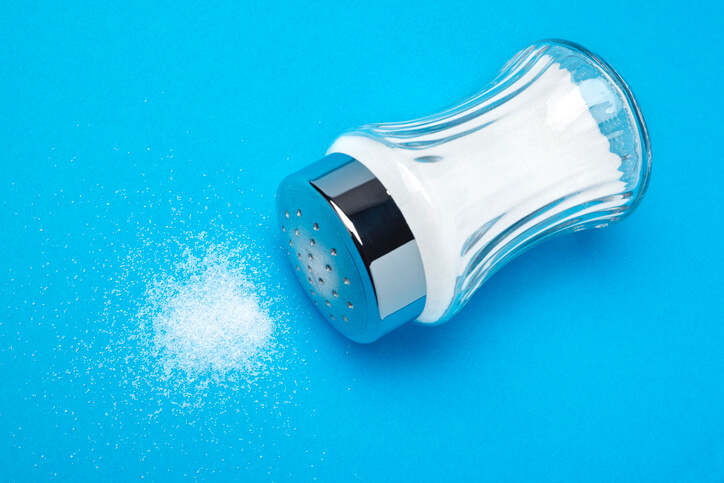If You’re a Cheese Lover, This May Be Good News!

Cheese is one of those foods some may say is healthy while others may say it’s not so good for you. For example, cheese is an excellent source of calcium, vitamin D and other nutrients as well as probiotics. But cheese is also high in saturated fat and salt (sodium) which may not be good for heart health and other metabolic concerns.
With that said, I recently came across a new study conducted by researchers at Penn State which found evidence that eating cheese may actually counteract blood vessel damage from consuming too much salt.

Many of us consume a lot more salt than we need. It’s true that we all need a small amount of salt in order for our bodies to carry out certain functions such as certain nerve impulses, contracting and relaxing muscles and maintaining the right balance of water and minerals. But we really only need about 500 mg of sodium daily, and many of us are consuming more than 3,400 mg of sodium per day! And we may be doing major damage to our health as a result of such high intake.
“In most people, the kidneys have trouble keeping up with excess sodium in the blood. As sodium accumulates, the body holds onto water to dilute the sodium. This increases both the amount of fluid surrounding cells and the volume of blood in the bloodstream,” reports Harvard T.H. Chan School of Public Health.
“Increased blood volume means more work for the heart and more pressure on blood vessels. Over time, the extra work and pressure can stiffen blood vessels, leading to high blood pressure, heart attack, and stroke.”
It may sound contradictory that cheese, which can be high in salt, would diminish damage to blood vessels incurred from a high salt diet. But apparently the antioxidants found in cheese may lessen the blow.
According to this report discussing the study, the researchers found that when adults followed a high-sodium diet they experienced blood vessel dysfunction (which is a sign of vascular disease). But when this same group of people also consumed four servings of cheese per day (along with the high-sodium diet), they did not experience blood vessel dysfunction.
This finding is a big deal especially for thoses people who seem to incorporate too much salt in their diet. It can be really challenging to reduce salt intake because so many food products contain added sodium.
Clearly, if there is a particular food, such as cheese, that may combat the damaging effects of salt, this could be key in helping prevent these health issues - especially if you are unsuccessful in cutting your salt intake.
Furthermore, one of the researchers involved in the study mentions in the report that previous research has shown that consuming dairy products in general (including cheeses high in sodium) improved heart health measures.
"We wanted to look at those connections more closely as well as explore some of the precise mechanisms by which cheese, a dairy product, may affect heart health," she said.
So in order to do this, the researchers recruited 11 adults without “salt-sensitive blood pressure.” The participants followed four separate diets for eight days at a time. The diets were:
- Low-sodium, dairy-free (1,500 mg of salt a day)
- Low-sodium, high-cheese (1,500 mg of salt a day, 170 grams, or about four servings, of several different types of cheese a day)
- High-sodium, dairy-free (5,500 mg of salt per day)
- High-sodium, high-cheese (5,500 mg of salt per day, 170 grams, or about four servings, of several different types of cheese a day)
After following each diet, participants underwent testing.
“The researchers inserted tiny fibers under the participants' skin and applied a small amount of the drug acetylcholine, a compound that signals blood vessels to relax. By examining how each participants' blood vessels reacted to the drug, the researchers were able to measure blood vessel function,” according to the report.
The participants’ blood pressure was also monitored, and urine samples were taken to make sure they were consuming the correct amounts of salt for each type of diet.
Results?
People on the high-sodium, no cheese or dairy diet had a difficult time with getting their blood vessels to relax. On the other hand, the high-sodium, high-cheese diet produced different results (despite being just as high in sodium as the high-sodium, no cheese or dairy diet).
"While the participants were on the high-sodium diet without any cheese, we saw their blood vessel function dip to what you would typically see in someone with pretty advanced cardiovascular risk factors," said one of the lead researchers.
"But when they consumed the same amount of salt, and ate cheese as a source of that salt, those effects were completely avoided."
Another one of the researchers said, "There is scientific evidence that dairy-based nutrients, specifically peptides generated during the digestion of dairy proteins, have beneficial antioxidant properties, meaning that they have the ability to scavenge these oxidant molecules and thereby protect against their damaging physiological effects."
More research is needed particularly within a larger scale study.
But the results of this study are exciting especially if you love cheese and other dairy products. Of course it is always good to seek the advice of a competent healthcare professional regarding your diet and how much cheese and dairy you should be consuming. This is especially important for people who are overweight or obese or already have metabolic issues such as high blood pressure and high cholesterol.
There are many types of cheeses and dairy products, so ask your doctor which ones are best for you. A general rule of thumb is to go for real cheese as opposed to processed. And depending on your health status, you may be better off with low-fat dairy as opposed to full-fat.
Of course, not everyone enjoys eating dairy or can eat it due to being lactose intolerant. So it’s important to eat plenty of potassium-rich foods, such as fresh fruits and vegetables, in order to balance out the salt in your diet. Potassium is a mineral that works with sodium to balance the fluids and electrolytes in the body. Potassium helps keep blood pressure under control and may even help reduce kidney stones and bone loss as you age.
Finally, with the number of people who inadvertenly get too much salt from their diet, it is imiportant to identify studies like these which explore foods that may reduce the damaging effects of salt. But we still have to be proactive and try to balance our intake of sodium in our daily diets. For some helpful, easy to follow tips on reducing salt, read here.
Enjoy your healthy life!
The pH professional health care team includes recognized experts from a variety of health care and related disciplines, including physicians, attorneys, nutritionists, nurses and certified fitness instructors. This team also includes the members of the pH Medical Advisory Board, which constantly monitors all pH programs, products and services. To learn more about the pH Medical Advisory Board, click here.







